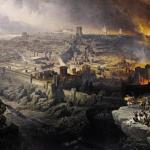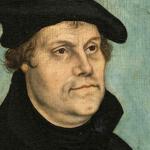The following was delivered as a Convocation Address at the beginning of the 2017-18 Theopolis Institute’s Junior Fellows Program on August 14, 2017.
Theopolis is the embodiment of a dream. Our name expresses the contents of that dream. We dream of a polis, a city.
Every city is a dreamscape, a screen on which we project our fantasies. William Carlos Williams’s poem, “Perpetuum Mobile,” follows a couple in their exploration of New York. Approaching the city, they “stand / and stare / transfixed,” awed at the dawn of city lights “all at once / in the east / rising! / All white!” From a distance, it looks as “small / as a flower.” Glittering under a black sky, New York is “a dream / toward which / we love.”
The city promises to satisfy every desire, and “there is no end / to desire.” It promises freedom, freedom from the drudgery of the land, freedom from the all-seeing eye of neighbors and family, the freedom of anonymity.
Before long, they realize the dream is “more / than a little / false.” They scrounge but can buy nothing but “an old rug.” The city is full of money, but also full of men armed with automatics who hold up the bank and “drive off / for themselves / the money / in an armored car.” In nightmarish flashes, they see a black man suffering bizarre torture, “dragged / insensible / upon his face / by the lines.”
Above ground, people guzzle “creamy foods,” but “in / the sub-cellar” in the guts of the city, there’s “waste fat / the old vegetables / chucked down / a chute / the foulest / sink in the world.”
The city’s shimmering “dream of lights” hides the “iron reason” that imprisons the residents. As the couple leaves New York at the end of the poem, a “wall of rain” makes the “hard grey” of the city dwindle. The city of light that beckoned them dissolves into a mournful city of tears.
Every city is a dreamscape, a screen onto which we project our boundless desires. But Williams reminds us that cities breed darkling terrors that clash by night.
Cities have always been so. Such were ancient Nineveh and Babylon, Athens and Rome. The lights and the pleasures and the satisfactions are real enough, but disillusionment rapidly sets in.
The Apostle John might have forewarned them, for this city of light is a whore. Pay her for your pleasure, but when you’re done you’re discarded, as she calls out, “Next!”
Cities have always been whores, but citizens of the harlot city have long dreamed of another city, clean and bright. Plato constructed a fantasy palace of justice in his Politeia. For Christians of the Middle Ages, the Augustinian dream of another city inspired “men to organize the earth into a single society made to the image and likeness of the heavenly city” (Etienne Gilson).
Enlightened philosophes were secular Augustinians, and the modern world is a product of their visions of a unheavenly city of reason and tolerance.
If there’s anything unique about today’s city, it’s cynicism about these dreams. Many are convinced that the harlot city is the only city there is, the only city that can be. Nietzsche blamed Christianity, charging that nihilism is an unintended byproduct of the faith. Christianity taught contempt for this world because a better world is coming, and the sunny humanism of the Enlightenment perpetuated the Christian illusion of a better tomorrow.
Now we’re awake, and the dream city dissolves in the light of day. We’re left with only the lingering taste of contempt and bewildered rage at the discovery that the metropolis is nothing but the sub-cellar, the “foulest / sink in the world.”
“How lonely sits the city.” Utopian dreams have given way to dystopian hallucinations. Unimaginable wealth shares the block with dehumanizing poverty. Whites hate blacks, blacks hate whites. Down the road from the gleaming capitol are homes of voiceless thousands. Sexual perversions are guarded by shock troops of sexual fascists. Every city is Gotham.
In our age of broken dreams, we at Theopolis dare to keep dreaming Augustinianly. We witness against cynicism because the city we seek isn’t a mere polis, but the polis of theos, the city of God. This city isn’t nowhere or out there. Utopia has taken flesh and dwells among us. She’s a bridal city, and we call her the church.
Let’s be honest: God’s city of light is herself shrouded in darkness. She’s stopped her ears to the voice of her husband. She won’t worship him as Lord. She leaves the wedding feast for a table of demons.
Some churches can’t decide whether to kill or protect unborn babies, whether boys are boys and girls girls, whether marriage requires a man and a woman. Others turn a blind eye to gluttony and greed, to structural injustice and trust in smart bombs, and can’t tell the difference between Christ’s empire and America’s. For generations, the bride has been adulterous. Her makeover makes her look like a whore.
Our confidence about the church isn’t confidence in the church. We dare to dream of a faithful bridal city because we believe the Word of the God who says, panta poio kaina, “all things I make new.” All things new – even the church. Because of God’s enduring promise, she is and will be a city of dazzling light and loyal love, drawing the nations, a bridal city living next to the brothel.
You three are here, I presume, because you share our dreams and our sense of the magnitude of the church’s failures and the world’s needs. You aspire to be like Paul, that wise master builder. You want to be Bezalels, Oholiabs, Huram-abis, who built the sanctuaries of ancient Israel. You hope to imitate Joash, Hezekiah, and Josiah, who purged idols and repaired the breaches of God’s ruined house.
We want to nurture these aspirations and ambitions. We want to fill out those dreams. Over the next year, we’ll study the blueprints of God’s city. You’ll improve your skill in the basic tools of this craft, the Word and worship of God. We trust you’ll be more inspired at the end than you are at the beginning.
As you begin, let me leave you with a sobering and humbling reminder that I hope will stay with you throughout the year. God builds His city from within, because God and the Lamb are in her midst. For that reason, it looks as if the city is building – edifying – herself. She does, but she does only because of gifts she receives from the Spirit.
You’re the very first class of Theopolis. Your presence here is an answer to prayer, and a major turning point in the life of our Institute. Set a good trajectory for those who follow. Don’t be bewitched into thinking that you’ll build by your own wisdom or skill.
Keep your eye on the heavenly pattern. Keep in step with the Spirit, the master designer and workman. Only then will you be truly Theopolitan. Only then will you help build a real dream city with foundations in heaven, whose Architect and Builder is God.
May God richly bless you in the coming year.
















